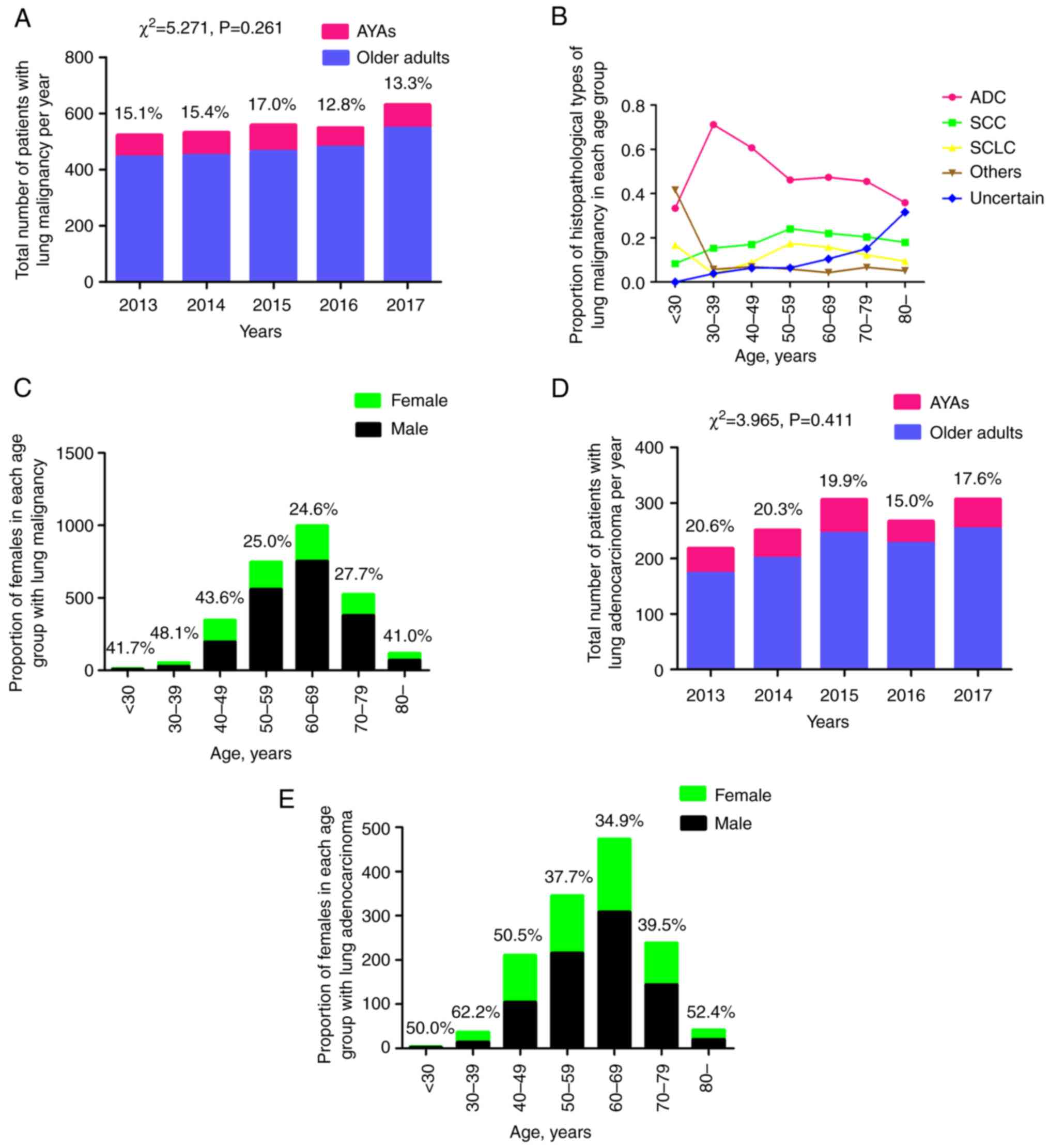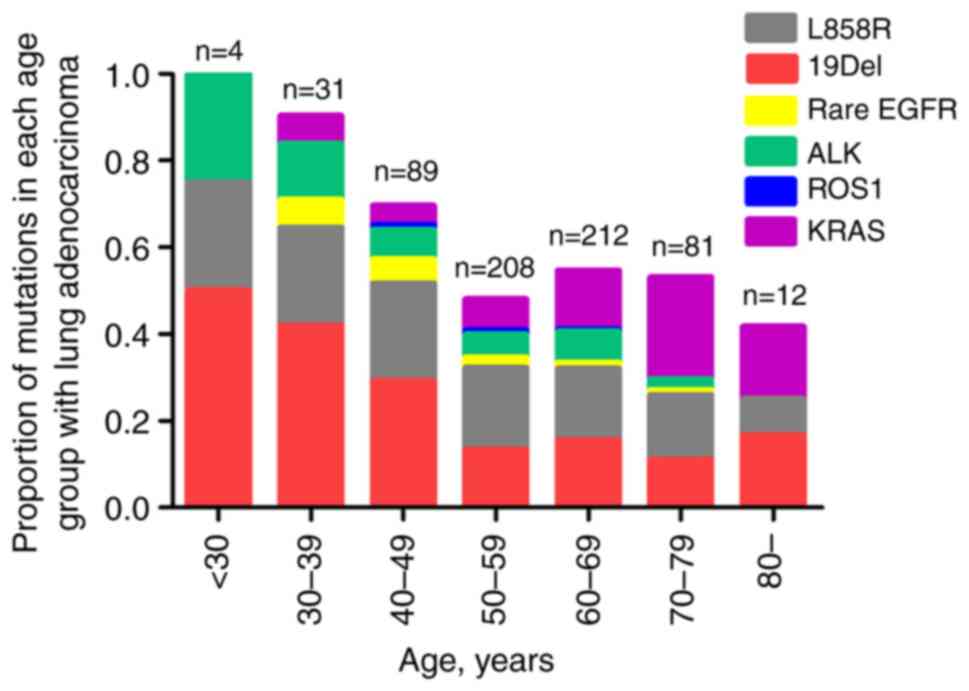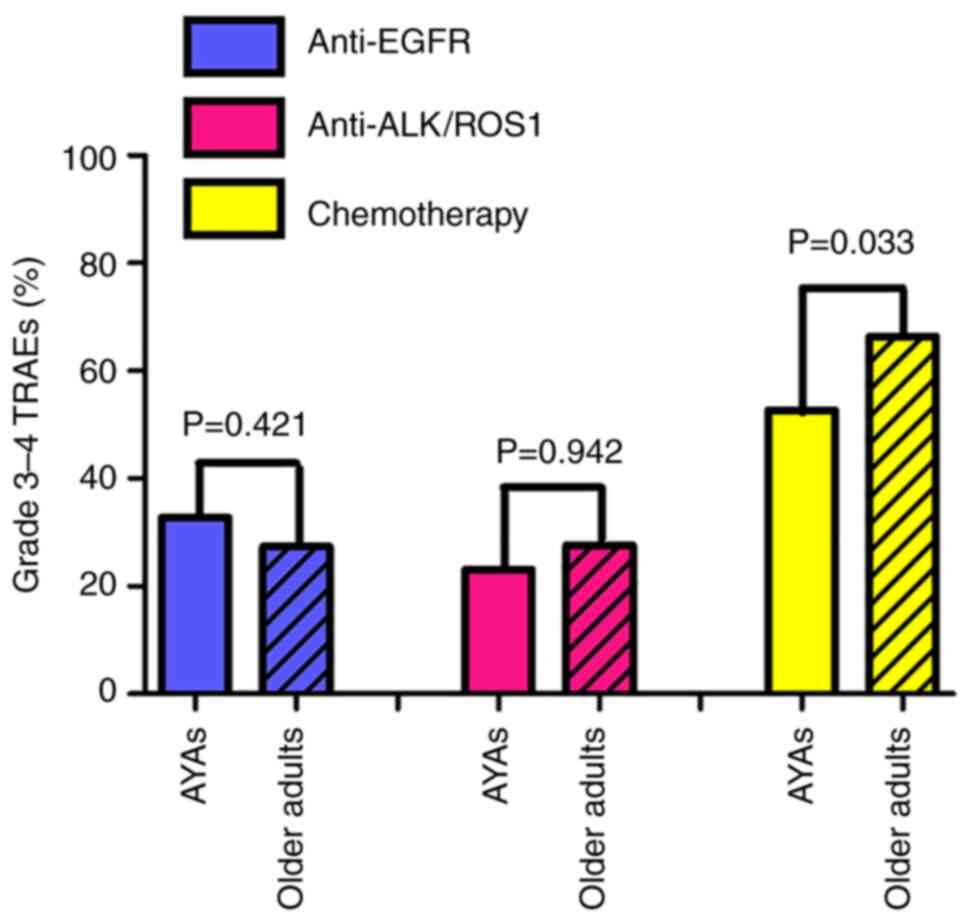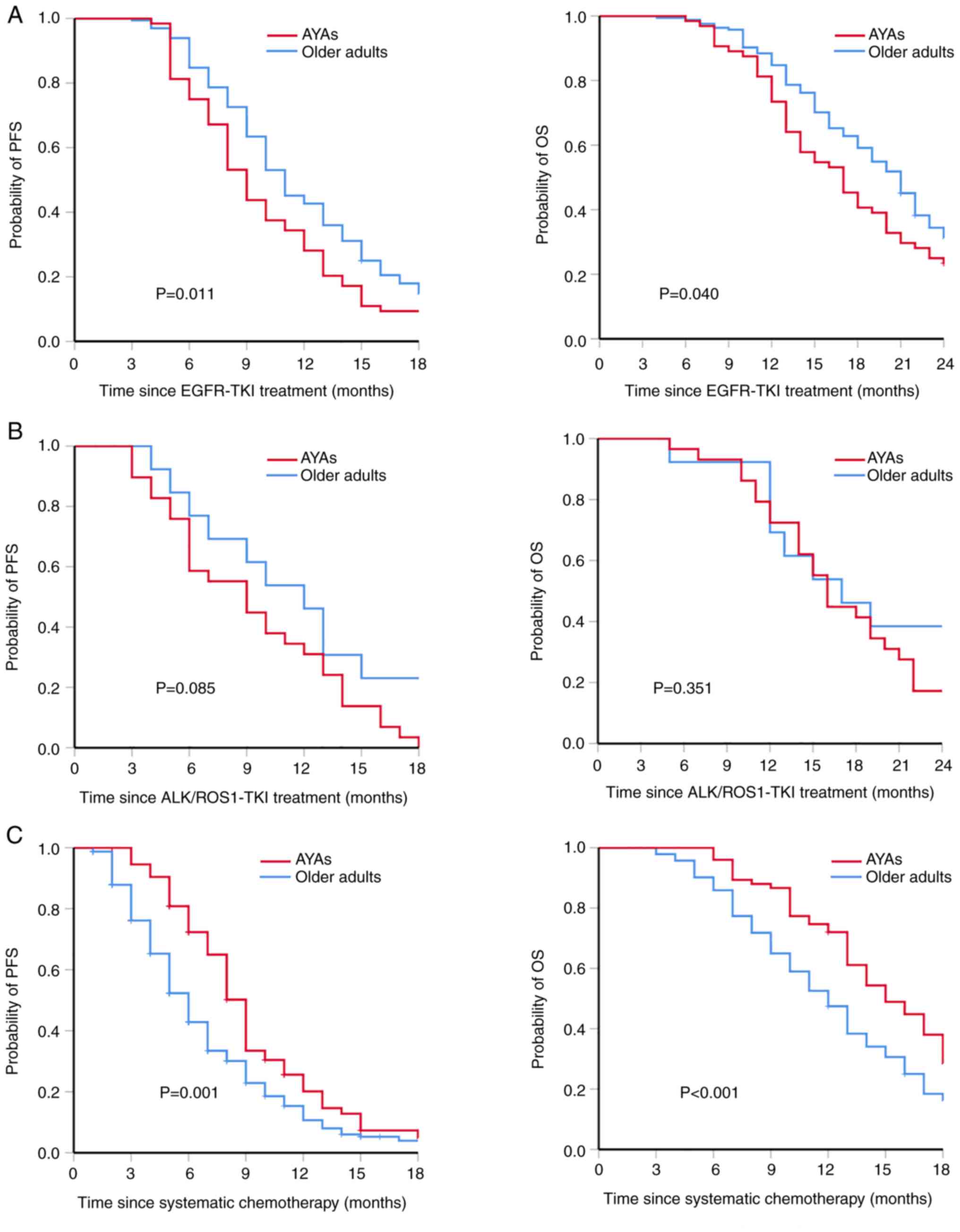|
1
|
Sung H, Ferlay J, Siegel RL, Laversanne M,
Soerjomataram I, Jemal A and Bray F: Global cancer statistics 2020:
GLOBOCAN estimates of incidence and mortality worldwide for 36
cancers in 185 countries. CA Cancer J Clin. 71:209–249. 2021.
View Article : Google Scholar : PubMed/NCBI
|
|
2
|
Lara MS, Brunson A, Wun T, Tomlinson B, Qi
L, Cress R, Gandara DR and Kelly K: Predictors of survival for
younger patients less than 50 years of age with non-small cell lung
cancer (NSCLC): A California cancer registry analysis. Lung Cancer.
85:264–269. 2014. View Article : Google Scholar : PubMed/NCBI
|
|
3
|
Inoue M, Okumura M, Sawabata N, Miyaoka E,
Asamura H, Yoshino I, Tada H, Fujii Y, Nakanishi Y, Eguchi K, et
al: Clinicopathological characteristics and surgical results of
lung cancer patients aged up to 50 years: The Japanese lung cancer
registry study 2004. Lung Cancer. 83:246–251. 2014. View Article : Google Scholar : PubMed/NCBI
|
|
4
|
Ramalingam S, Pawlish K, Gadgeel S, Demers
R and Kalemkerian GP: Lung cancer in young patients: Analysis of a
surveillance, epidemiology, and end results database. J Clin Oncol.
16:651–657. 1998. View Article : Google Scholar : PubMed/NCBI
|
|
5
|
Yang S, Song Z and Cheng G: Genomic
alterations and survival in young patients aged under 40 years with
completely resected non-small cell lung cancer. Ann Transl Med.
7:1402019. View Article : Google Scholar : PubMed/NCBI
|
|
6
|
Bratova M, Brat K, Hurdalkova K, Barinova
M, Drosslerova M, Kultan J, Wanke M, Koubkova L, Krejci J and
Svaton M: Lung cancer versus ‘young cancer’: Is non-small cell lung
cancer in young patients a different entity? J Adolesc Young Adult
Oncol. Nov 2–2021.(Epub ahead of print). View Article : Google Scholar : PubMed/NCBI
|
|
7
|
Arnold BN, Thomas DC, Rosen JE, Salazar
MC, Blasberg JD, Boffa DJ, Detterbeck FC and Kim AW: Lung cancer in
the very young: Treatment and survival in the national cancer data
base. J Thorac Oncol. 11:1121–1131. 2016. View Article : Google Scholar : PubMed/NCBI
|
|
8
|
Subramanian J, Morgensztern D, Goodgame B,
Baggstrom MQ, Gao F, Piccirillo J and Govindan R: Distinctive
characteristics of non-small cell lung cancer (NSCLC) in the young:
A surveillance, epidemiology, and end results (SEER) analysis. J
Thorac Oncol. 5:23–28. 2010. View Article : Google Scholar : PubMed/NCBI
|
|
9
|
Viñal D, Martínez D, Higuera O and de
Castro J: Genomic profiling in non-small-cell lung cancer in young
patients. A systematic review. ESMO Open. 6:1000452021. View Article : Google Scholar : PubMed/NCBI
|
|
10
|
Garrana SH, Dagogo-Jack I, Cobb R, Kuo AH,
Mendoza DP, Zhang EW, Heeger A, Sequist LV and Digumarthy SR:
Clinical and imaging features of non-small-cell lung cancer in
young patients. Clin Lung Cancer. 22:23–31. 2021. View Article : Google Scholar : PubMed/NCBI
|
|
11
|
Chen L, Hu X, Wu H, Liu J, Mu X, Wu H and
Zhao Y: Unique profiles of targetable genomic alterations and
prognosis in young Chinese patients with lung adenocarcinoma.
Pathol Res Pract. 215:1524072019. View Article : Google Scholar : PubMed/NCBI
|
|
12
|
Sacher AG, Dahlberg SE, Heng J, Mach S,
Jänne PA and Oxnard GR: Association between younger age and
targetable genomic alterations and prognosis in non-small-cell lung
cancer. JAMA Oncol. 2:313–320. 2016. View Article : Google Scholar : PubMed/NCBI
|
|
13
|
Pan X, Lv T, Zhang F, Fan H, Liu H and
Song Y: Frequent genomic alterations and better prognosis among
young patients with non-small-cell lung cancer aged 40 years or
younger. Clin Transl Oncol. 20:1168–1174. 2018. View Article : Google Scholar : PubMed/NCBI
|
|
14
|
Xia W, Wang A, Jin M, Mao Q, Xia W, Dong
G, Chen B, Ma W, Xu L and Jiang F: Young age increases risk for
lymph node positivity but decreases risk for non-small cell lung
cancer death. Cancer Manag Res. 10:41–48. 2018. View Article : Google Scholar : PubMed/NCBI
|
|
15
|
Hu M, Tan J, Liu Z, Li L, Zhang H, Zhao D,
Li B, Gao X, Che N and Zhang T: Comprehensive comparative molecular
characterization of young and old lung cancer patients. Front
Oncol. 11:8068452021. View Article : Google Scholar : PubMed/NCBI
|
|
16
|
Zhou Q, Fan Y, Wang Y, Qiao Y, Wang G,
Huang Y, Wang X, Wu N, Zhang G, Zheng X, et al: China national lung
cancer screening guideline with low-dose computed tomography (2018
version). Zhongguo Fei Ai Za Zhi. 21:67–75. 2018.(In Chinese).
PubMed/NCBI
|
|
17
|
Zhou QH, Fan YG, Bu H, Wang Y, Wu N, Huang
YC, Wang G, Wang XY and Qiao YL: China national lung cancer
screening guideline with low-dose computed tomography (2015
version). Thorac Cancer. 6:812–818. 2015. View Article : Google Scholar : PubMed/NCBI
|
|
18
|
Expert Panel on Thoracic Imaging, . de
Groot PM, Chung JH, Ackman JB, Berry MF, Carter BW, Colletti PM,
Hobbs SB, McComb BL, Movsas B, et al: ACR appropriateness
criteria® noninvasive clinical staging of primary lung
cancer. J Am Coll Radiol. 16 (5 Suppl):S184–S195. 2019. View Article : Google Scholar : PubMed/NCBI
|
|
19
|
Morse B, Jeong D, Ihnat G and Silva AC:
Pearls and pitfalls of response evaluation criteria in solid tumors
(RECIST) v1.1 non-target lesion assessment. Abdom Radiol (NY).
44:766–774. 2019. View Article : Google Scholar : PubMed/NCBI
|
|
20
|
Chen AP, Setser A, Anadkat MJ, Cotliar J,
Olsen EA, Garden BC and Lacouture ME: Grading dermatologic adverse
events of cancer treatments: The common terminology criteria for
adverse events version 4.0. J Am Acad Dermatol. 67:1025–1039. 2012.
View Article : Google Scholar : PubMed/NCBI
|
|
21
|
Yang S, Du R, Huang M, Wan R, Li W and
Zhou L: Analysis of sociodemographic and clinical factors
influencing the treatment compliance of patients with lung cancer.
J Pract Med. 36:2714–2719. 2020.(In Chinese).
|
|
22
|
Pinto JA, Vallejos CS, Raez LE, Mas LA,
Ruiz R, Torres-Roman JS, Morante Z, Araujo JM, Gómez HL, Aguilar A,
et al: Gender and outcomes in non-small cell lung cancer: An old
prognostic variable comes back for targeted therapy and
immunotherapy? ESMO Open. 3:e0003442018. View Article : Google Scholar : PubMed/NCBI
|
|
23
|
Ragavan M and Patel MI: The evolving
landscape of sex-based differences in lung cancer: A distinct
disease in women. Eur Respir Rev. 31:2101002022. View Article : Google Scholar : PubMed/NCBI
|
|
24
|
Mederos N, Friedlaender A, Peters S and
Addeo A: Gender-specific aspects of epidemiology, molecular
genetics and outcome: Lung cancer. ESMO Open. 5 (Suppl
4):e0007962020. View Article : Google Scholar : PubMed/NCBI
|
|
25
|
Campbell JD, Alexandrov A, Kim J, Wala J,
Berger AH, Pedamallu CS, Shukla SA, Guo G, Brooks AN, Murray BA, et
al: Distinct patterns of somatic genome alterations in lung
adenocarcinomas and squamous cell carcinomas. Nat Genet.
48:607–616. 2016. View
Article : Google Scholar : PubMed/NCBI
|
|
26
|
Tavernari D, Battistello E, Dheilly E,
Petruzzella AS, Mina M, Sordet-Dessimoz J, Peters S, Krueger T,
Gfeller D, Riggi N, et al: Nongenetic evolution drives lung
adenocarcinoma spatial heterogeneity and progression. Cancer
Discov. 11:1490–1507. 2021. View Article : Google Scholar : PubMed/NCBI
|
|
27
|
Huang J, Deng Y, Tin MS, Lok V, Ngai CH,
Zhang L, Lucero-Prisno DE III, Xu W, Zheng ZJ, Elcarte E, et al:
Distribution, risk factors, and temporal trends for lung cancer
incidence and mortality: A global analysis. Chest. 161:1101–1111.
2022. View Article : Google Scholar : PubMed/NCBI
|
|
28
|
Siegel RL, Miller KD and Jemal A: Cancer
statistics, 2018. CA Cancer J Clin. 68:7–30. 2018. View Article : Google Scholar : PubMed/NCBI
|
|
29
|
Galvez-Nino M, Ruiz R, Pinto JA, Roque K,
Mantilla R, Raez LE and Mas L: Lung cancer in the young. Lung.
198:195–200. 2020. View Article : Google Scholar : PubMed/NCBI
|
|
30
|
Thomas A, Chen Y, Yu T, Jakopovic M and
Giaccone G: Trends and characteristics of young non-small cell lung
cancer patients in the United States. Front Oncol. 5:1132015.
View Article : Google Scholar : PubMed/NCBI
|
|
31
|
Fidler-Benaoudia MM, Torre LA, Bray F,
Ferlay J and Jemal A: Lung cancer incidence in young women vs.
young men: A systematic analysis in 40 countries. Int J Cancer.
147:811–819. 2020. View Article : Google Scholar : PubMed/NCBI
|
|
32
|
Ruano-Ravina A, Varela Lema L, García
Talavera M, García Gómez M, González Muñoz S, Santiago-Pérez MI,
Rey-Brandariz J, Barros-Dios J and Pérez-Ríos M: Lung cancer
mortality attributable to residential radon exposure in Spain and
its regions. Environ Res. 199:1113722021. View Article : Google Scholar : PubMed/NCBI
|
|
33
|
Risch HA, Howe GR, Jain M, Burch JD,
Holowaty EJ and Miller AB: Are female smokers at higher risk for
lung cancer than male smokers? A case-control analysis by
histologic type. Am J Epidemiol. 138:281–293. 1993. View Article : Google Scholar : PubMed/NCBI
|
|
34
|
Freedman ND, Leitzmann MF, Hollenbeck AR,
Schatzkin A and Abnet CC: Cigarette smoking and subsequent risk of
lung cancer in men and women: Analysis of a prospective cohort
study. Lancet Oncol. 9:649–656. 2008. View Article : Google Scholar : PubMed/NCBI
|
|
35
|
Bain C, Feskanich D, Speizer FE, Thun M,
Hertzmark E, Rosner BA and Colditz GA: Lung cancer rates in men and
women with comparable histories of smoking. J Natl Cancer Inst.
96:826–834. 2004. View Article : Google Scholar : PubMed/NCBI
|
|
36
|
Zhang T, Joubert P, Ansari-Pour N, Zhao W,
Hoang PH, Lokanga R, Moye AL, Rosenbaum J, Gonzalez-Perez A,
Martínez-Jiménez F, et al: Genomic and evolutionary classification
of lung cancer in never smokers. Nat Genet. 53:1348–1359. 2021.
View Article : Google Scholar : PubMed/NCBI
|
|
37
|
Hou H, Zhang C, Qi X, Zhou L, Liu D, Lv H,
Li T, Sun D and Zhang X: Distinctive targetable genotypes of
younger patients with lung adenocarcinoma: A cBioPortal for cancer
genomics data base analysis. Cancer Biol Ther. 21:26–33. 2020.
View Article : Google Scholar : PubMed/NCBI
|
|
38
|
He CH, Shih JF, Lai SL and Chen YM:
Non-small cell lung cancer in the very young: Higher EGFR/ALK
mutation proportion than the elder. J Chin Med Assoc. 83:461–465.
2020. View Article : Google Scholar : PubMed/NCBI
|
|
39
|
Shi Y, Au JS, Thongprasert S, Srinivasan
S, Tsai CM, Khoa MT, Heeroma K, Itoh Y, Cornelio G and Yang PC: A
prospective, molecular epidemiology study of EGFR mutations in
Asian patients with advanced non-small-cell lung cancer of
adenocarcinoma histology (PIONEER). J Thorac Oncol. 9:154–162.
2014. View Article : Google Scholar : PubMed/NCBI
|
|
40
|
Tanaka K, Hida T, Oya Y, Yoshida T,
Shimizu J, Mizuno T, Kuroda H, Sakakura N, Yoshimura K, Horio Y, et
al: Unique prevalence of oncogenic genetic alterations in young
patients with lung adenocarcinoma. Cancer. 123:1731–1740. 2017.
View Article : Google Scholar : PubMed/NCBI
|
|
41
|
Ye T, Pan Y, Wang R, Hu H, Zhang Y, Li H,
Wang L, Sun Y and Chen H: Analysis of the molecular and
clinicopathologic features of surgically resected lung
adenocarcinoma in patients under 40 years old. J Thorac Dis.
6:1396–1402. 2014.PubMed/NCBI
|
|
42
|
Fukuoka M, Wu YL, Thongprasert S,
Sunpaweravong P, Leong SS, Sriuranpong V, Chao TY, Nakagawa K, Chu
DT, Saijo N, et al: Biomarker analyses and final overall survival
results from a phase III, randomized, open-label, first-line study
of gefitinib versus carboplatin/paclitaxel in clinically selected
patients with advanced non-small-cell lung cancer in Asia (IPASS).
J Clin Oncol. 29:2866–2874. 2011. View Article : Google Scholar : PubMed/NCBI
|
|
43
|
Wu YL, Zhou C, Liam CK, Wu G, Liu X, Zhong
Z, Lu S, Cheng Y, Han B, Chen L, et al: First-line erlotinib versus
gemcitabine/cisplatin in patients with advanced EGFR
mutation-positive non-small-cell lung cancer: Analyses from the
phase III, randomized, open-label, ENSURE study. Ann Oncol.
26:1883–1889. 2015. View Article : Google Scholar : PubMed/NCBI
|
|
44
|
Soda M, Choi YL, Enomoto M, Takada S,
Yamashita Y, Ishikawa S, Fujiwara S, Watanabe H, Kurashina K,
Hatanaka H, et al: Identification of the transforming EML4-ALK
fusion gene in non-small-cell lung cancer. Nature. 448:561–566.
2007. View Article : Google Scholar : PubMed/NCBI
|
|
45
|
Solomon BJ, Mok T, Kim DW, Wu YL, Nakagawa
K, Mekhail T, Felip E, Cappuzzo F, Paolini J, Usari T, et al:
First-line crizotinib versus chemotherapy in ALK-positive lung
cancer. N Engl J Med. 371:2167–2177. 2014. View Article : Google Scholar : PubMed/NCBI
|
|
46
|
Tang WF, Fu R, Liang Y, Lin JS, Qiu ZB, Wu
YL and Zhong WZ: Genomic evolution of lung cancer metastasis:
Current status and perspectives. Cancer Commun (Lond).
41:1252–1256. 2021. View Article : Google Scholar : PubMed/NCBI
|
|
47
|
Stinchcombe TE, Zhang Y, Vokes EE,
Schiller JH, Bradley JD, Kelly K, Curran WJ Jr, Schild SE, Movsas
B, Clamon G, et al: Pooled analysis of individual patient data on
concurrent chemoradiotherapy for stage III non-small-cell lung
cancer in elderly patients compared with younger patients who
participated in US national cancer institute cooperative group
studies. J Clin Oncol. 35:2885–2892. 2017. View Article : Google Scholar : PubMed/NCBI
|
|
48
|
Schiller JH, Harrington D, Belani CP,
Langer C, Sandler A, Krook J, Zhu J and Johnson DH; Eastern
Cooperative Oncology Group, : Comparison of four chemotherapy
regimens for advanced non-small-cell lung cancer. N Engl J Med.
346:92–98. 2002. View Article : Google Scholar : PubMed/NCBI
|
|
49
|
Zhou Y, Zhang Y, Guo G, Cai X, Yu H, Cai
Y, Zhang B, Hong S and Zhang L: Nivolumab plus ipilimumab versus
pembrolizumab as chemotherapy-free, first-line treatment for
PD-L1-positive non-small cell lung cancer. Clin Transl Med.
10:107–115. 2020. View Article : Google Scholar : PubMed/NCBI
|
|
50
|
Klener P Jr, Etrych T and Klener P:
Biological therapy of hematologic malignancies: Toward a
chemotherapy-free era. Curr Med Chem. 26:1002–1018. 2019.
View Article : Google Scholar : PubMed/NCBI
|
|
51
|
Coelho MA, de Carné, Trécesson S, Rana S,
Zecchin D, Moore C, Molina-Arcas M, East P, Spencer-Dene B, Nye E,
Barnouin K, et al: Oncogenic RAS signaling promotes tumor
immunoresistance by stabilizing PD-L1 mRNA. Immunity.
47:1083–1099.e6. 2017. View Article : Google Scholar : PubMed/NCBI
|
|
52
|
Adderley H, Blackhall FH and Lindsay CR:
KRAS-mutant non-small cell lung cancer: Converging small molecules
and immune checkpoint inhibition. EBioMedicine. 41:711–716. 2019.
View Article : Google Scholar : PubMed/NCBI
|
|
53
|
Zhang X, Zeng L, Li Y, Xu Q, Yang H,
Lizaso A, Mao X, Jin R, Zeng Y, Li Q, et al: Anlotinib combined
with PD-1 blockade for the treatment of lung cancer: A real-world
retrospective study in China. Cancer Immunol Immunother.
70:2517–2528. 2021. View Article : Google Scholar : PubMed/NCBI
|
|
54
|
Panian J, Lin X, Simantov R, Derweesh I,
Choueiri TK and McKay RR: The impact of age and gender on outcomes
of patients with advanced renal cell carcinoma treated with
targeted therapy. Clin Genitourin Cancer. 18:e598–e609. 2020.
View Article : Google Scholar : PubMed/NCBI
|
|
55
|
Bryant AS and Cerfolio RJ: Differences in
outcomes between younger and older patients with non-small cell
lung cancer. Ann Thorac Surg. 85:1735–1739. 2008. View Article : Google Scholar : PubMed/NCBI
|
|
56
|
Durham BH, Lopez Rodrigo E, Picarsic J,
Abramson D, Rotemberg V, De Munck S, Pannecoucke E, Lu SX, Pastore
A, Yoshimi A, et al: Activating mutations in CSF1R and additional
receptor tyrosine kinases in histiocytic neoplasms. Nat Med.
25:1839–1842. 2019. View Article : Google Scholar : PubMed/NCBI
|
|
57
|
Noronha V, Patil VM, Joshi A, Menon N,
Chougule A, Mahajan A, Janu A, Purandare N, Kumar R, More S, et al:
Gefitinib versus gefitinib plus pemetrexed and carboplatin
chemotherapy in EGFR-mutated lung cancer. J Clin Oncol. 38:124–136.
2020. View Article : Google Scholar : PubMed/NCBI
|
|
58
|
Yang JC, Cheng Y, Murakami H, Yang PC, He
J, Nakagawa K, Kang JH, Kim JH, Hozak RR, Nguyen TS, et al: A
randomized phase 2 study of gefitinib with or without pemetrexed as
first-line treatment in nonsquamous NSCLC With EGFR mutation: Final
overall survival and biomarker analysis. J Thorac Oncol. 15:91–100.
2020. View Article : Google Scholar : PubMed/NCBI
|
|
59
|
Cheng Y, Murakami H, Yang PC, He J,
Nakagawa K, Kang JH, Kim JH, Wang X, Enatsu S, Puri T, et al:
Randomized phase II trial of gefitinib with and without pemetrexed
as first-line therapy in patients with advanced nonsquamous
non-small-cell lung cancer with activating epidermal growth factor
receptor mutations. J Clin Oncol. 34:3258–3266. 2016. View Article : Google Scholar : PubMed/NCBI
|
|
60
|
Hosomi Y, Morita S, Sugawara S, Kato T,
Fukuhara T, Gemma A, Takahashi K, Fujita Y, Harada T, Minato K, et
al: Gefitinib alone versus gefitinib plus chemotherapy for
non-small-cell lung cancer with mutated epidermal growth factor
receptor: NEJ009 study. J Clin Oncol. 38:115–123. 2020. View Article : Google Scholar : PubMed/NCBI
|
|
61
|
Han B, Jin B, Chu T, Niu Y, Dong Y, Xu J,
Gu A, Zhong H, Wang H, Zhang X, et al: Combination of chemotherapy
and gefitinib as first-line treatment for patients with advanced
lung adenocarcinoma and sensitive EGFR mutations: A randomized
controlled trial. Int J Cancer. 141:1249–1256. 2017. View Article : Google Scholar : PubMed/NCBI
|


















